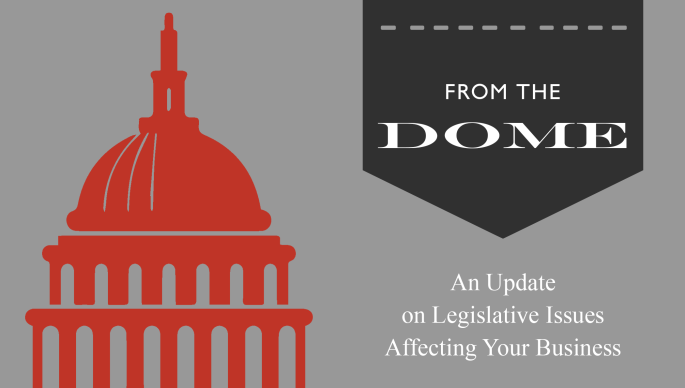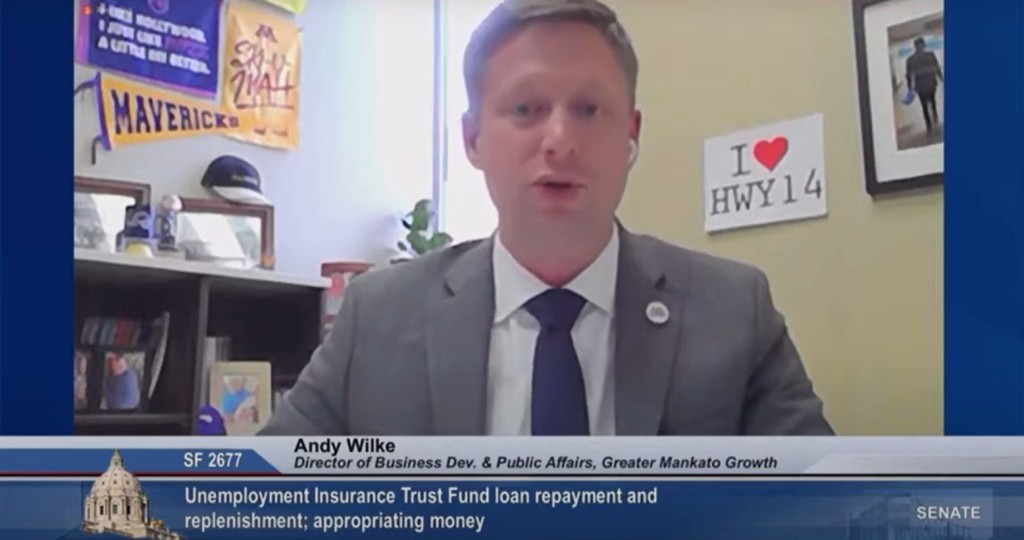
We are already into the second half of the 2022 legislative session. Unfortunately there has not been a lot accomplished yet, despite the legislature setting a record for the number of bills introduced with more than 4,700 in the Senate and 4,300 in the House. It seems that legislators have a lot ideas, but have taken very little action. We have passed all the committee deadlines and the House and Senate have started to move on their omnibus bills: taxes, transportation, environment, etc. Not surprisingly, the House and Senate omnibus bills are vastly different on both policy and fiscal impact. Much work will have to be done to come together in conference committee or with leadership.
Budget Surplus
The Senate passed the first omnibus tax bill off the Senate floor in bipartisan fashion. Among other things, it permanently reduces the first tier individual income tax rate from 5.3% to 2.8% and eliminates income tax on social security income. The Senate Republicans touted this as the “largest tax cut ever,” totaling $3.38 billion this biennium and $5 billion in the FY 24/25 biennium.
Meanwhile, the House DFL has taken a much different approach with their $1.65 billion tax bill, which includes tax cuts and credits for families with children, renters, and a sales tax exemption for construction materials for local government, among other tax credits.
As an example of the divergent positions all parties are taking, neither the House nor the Senate tax bills include Governor Walz’s proposed “Walz Checks” as direct payments to Minnesotans.
One area that has been noticeably absent is business tax relief. We have not seen any proposals from either chamber or party move forward to relieve businesses of their tax burden. Minnesota remains a top 10 state for business taxes. We hope to see some movement later in session on business property tax relief. Minnesota is one of only 16 states that has a state-wide property tax levy on commercial/industrial properties. It is the only state that does not dedicate that levy for a specific purpose, but just puts it in the general fund. We hope to see some progress in the last part of session to relieve some of this property tax burden on businesses throughout the state.
Unemployment Insurance Trust Fund
A deadline of March 15th, as shared by the Commissioner of the Department of Employment and Economic Development, Steve Grove, came and went with no action by the House on the unemployment trust fund (UITF). For all businesses and nonprofits throughout Minnesota this means that first quarter payroll taxes are due and will start trickling into the state.
Greater Mankato Growth continues to advocate lawmakers to fill the Unemployment Insurance Trust Fund (UITF) in order to avoid a double-digit tax increase for every employer who pays into this fund, which includes both businesses and nonprofits. Raising taxes in a year when the state has a $9.3 billion budget surplus is unconscionable. Employers who were forced to shut down their operations during the pandemic are now being penalized with a pandemic shutdown tax after the state paid nearly $15 billion in unemployment benefits. Greater Mankato Growth has continued to urge lawmakers to use $2.7 billion of federal pandemic relief funds and budget surplus dollars to fund the UITF to solvency. Doing so will avoid this unnecessary tax increase. If you would like more information or would like to share your company’s challenges with the unemployment insurance payroll taxes, please contact Andy Wilke. Follow this link to watch Andy’s testimony in front of the Senate Jobs Committee on February 7.

Bonding
The House has continued to hold hearings for potential bonding projects. They have not set a specific spending target, but we can expense something in the neighborhood of about $2 billion. This bodes well for the local area projects we support.
Greater Mankato Growth supports the bonding requests made by our regional public partners. These projects include critical infrastructure and amenities that are important to economic vitality of the region. These projects include:
- City of Mankato – Regional Water Resource Recovery Facility (wastewater treatment): $30 million
- City of North Mankato – Caswell Regional Sporting Complex phase 2: $8.5 million
- City of Skyline – Water Tower & Pump House: $900,000
- Minnesota State University, Mankato
- Armstrong Hall Replacement phase 1: $7.1 million
- HEAPR: $15.6 million
- South Central College – HEAPR: $2.6 million
Transportation
Transportation funding is always a top priority for GMG and this year is no different. Ensuring that we have a safe and efficient transportation system ensures that our businesses can get their goods to market. Auto parts sales taxes is one area of discussion that has received significant support this session. A portion of the sales tax on auto parts is currently reserved for transportation funding, but a bill that would dedicate all of this tax to transportation has passed unanimously through the Senate Transportation Committee. It would dedicate 86% to the Highway User Distribution Fund, 7% to townships, and 7% to small cities, making this the first time ever that small cities would have a dedicated funding stream for transportation purposes. The House took up a similar bill which allocated 40% to transit, whereas the Senate bill didn’t dedicate any funds to it. This discussion embodies the continued tension between the metro and Greater Minnesota when it comes to transportation and transit funding. The 2 chambers will try and come to a compromise, but that is no guaranteed.
Advocating for Businesses
Greater Mankato Growth staff continues to work on behalf of businesses and advocating for changes to policies that will improve business conditions. On Wednesday April 13th, the GMG Public Affairs Committee and GMG board of directors co-hosted a mid-session update with four area legislators. We discussed business issues including taxes, unemployment insurance trust fund, housing, bonding, and much more.

What’s Next
While the legislature has been in session for about two and a half months with about a month to go, there is still a lot of work to be done. Large spending bills (Omnibus) will start to work their way to the floors of the House and Senate for consideration and these two bodies will try and iron out their differences. This will be a big lift, as there has been very little coordination between the two chambers on these omnibus bills.
For a bonding bill to be passed, it will require bipartisan support in both chambers. There is reason to believe that nearly all legislators want to see some form of a bonding bill passed, but the focus and contents of that bill very greatly. Legislators will want to get local projects funded, this will require compromise and much consideration for regional balance. Mankato is a regional hub in greater Minnesota, as such we have a good story to tell with many of our projects.
Lastly, the State Office Building, where the House members office out of, is now open to the public three days a week. This is exciting news and really helps with access to the House members in order to share our priorities.
As always, if you have questions or comments, please reach out to Andy Wilke, our Director of Business Development and Public Affairs.




